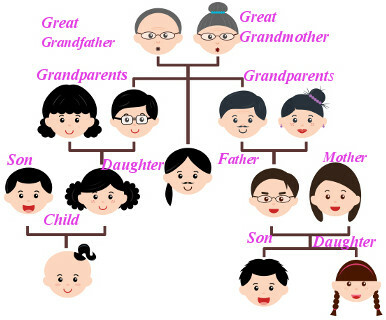Everybody has an origin, we came from a country, a state, a city, a family! Each family have their particularities: culture, differences in upbringing children and so on. We all have family member that we love, some that we live far away from us, some that we don't like very much, but, they still being our family! / Everyone has an origin, we come from a country, a state, a city, a family! Each family has its particularities: culture, differences in child rearing, among others. We all have family members that we love, some that live far away from us, some that we don't like as much, but they are still part of our family!
For this so important topic that is part of everyone's life, let's learn how we can talk about our family in English! / For this very important topic that is part of all of our lives, let's learn how we can talk about our family in English.
First of all your father and your mother you called them: Parents! Your family members, the other people from your family you called them: Relatives.
/ First of all your father and mother you call them? Parents! Your family members, other people, you call them Relatives.In Portuguese there's a division for your family made by the members that you are connected directly and the other ones. Your father, mother and siblings, you say they are your immediate family. All of your family member from your father and mother's families you can say that they are your extended family. / In English there is a division for your family made by the members that you have a more direct connection and with the others. Your father, mother and brothers, you can say they are part of your "immediate family" (immediate family). All the other members of your father's and mother's families you can tell they are yours. "extended family" (extended family).
Opportunity: Online English course
Sign up and get 50% DISCOUNT + FREE Brazilian national team shirt
In English, unlike in Portuguese, we don't say 'brothers' for boys and girls, we say 'brothers' for boys and 'sisters' for girls, if you have brothers and sisters, so you must call them siblings. If you have a son or daughter they are your child, and your husband or wife is your spouse. / In English, unlike Portuguese, we don't use the word 'brothers' for both girls and boys, we say "brothers" for boys and "sister" for girl, if you have brothers and sister then you should call them "siblings" (brothers). If you have a son or daughter, they are yours. "childrem" (children), and if you have a husband (husband) or wife (wife) he/she is yours "spouse" (spouse).
But, we know that the family isn't just made with bonds of blood, because there are some members who became part of it after some changes, as when someone got married, or death, or divorced. With this changes we face with a new family member in these cases we say that we have a step family. Some children are born into a step family when they are adopted, for example. / But, we know that a family is not just blood ties, because there are some members who become part of the family after some change, such as when someone marries, or dies, or divorces. With these changes we come across a new member, in these cases we can say that we have a "step family" (which would be in Portuguese as a foster or adoptive family). Some children are born into a foster family when they are adopted, for example.
We made a list with some of the most important members in family! / We made a list of some of the most important members of a family!
parents: father and mother / Parents: Father and mother.
Child - kid
Children - kids
Son – son
Daughter - daughter
brothr - brother
Sister - sister
grandfather - grandmother
Grandmother – grandmother
grandson - grandson
Granddaughter - Grand daugther
grandchild - grandchildren
Great Grandfather - great-grandmother
Great Grandmother - great grandfather
Great Granpaents - great grandparents
Uncle - uncle
Aunt – aunt
Cousin - cousin
nephew - nephew
Nice - niece
boyfriend - boyfriend
Girlfriend - girlfriend
bail - engaged
bride - fiancee
Groom – groom (only on wedding day)
Wife - wife
Husband - husband
Spouse - spouse
Father-in-law - father in law
Mother-in-law – mother-in-law
Parents-in-law - parents in law
Son-in-law – son in law
Daughter-in-law - daughter in law
Brother-in-law - brother in law
sister-in-law - sister in law
Godfather – Godfather
Godmother - godmother
Godson - godson
Goddaughter - goddaughter
Godchild - godson
Some examples: / Some examples:
I have one child. / I have a child.
I love my parents! / I love my parents
I have four siblings! / I have four brothers.
I live with my grandparents. / I live with my grandparents.
She didn't know her great parents. / She didn't know her great-grandparents.
He never has a godchild. / He never had a godson.
I went out last night with my sister-in-law. / I went out last night with my sister-in-law.
Look a Family tree in English and try to do your own1/ See a family tree in English and try to make your own!

By Janaína Mourão
Graduated in Letters - English

